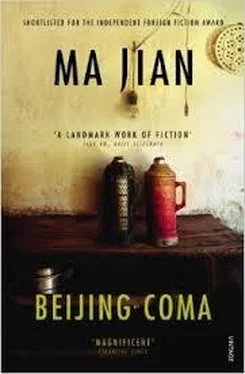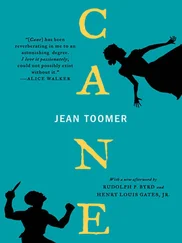As I listened to her talk about these things, I sensed a distance opening between us.
Suddenly the face of Lulu, the first girl I fell in love with, flashed through my mind. It took me back to that night when she sat next to me inside the large concrete pipe, her whole body shivering from the cold. I looked at the traffic outside and felt a wave of sadness sweep over me.
Just as a fish could never imagine being scooped from the sea, you could never have imagined that your love would end.
‘Number nine dribbles the ball past two defenders, but is intercepted by Peterson. Five takes it away, passes to seven, who strikes, and — oh dear! — hits the goalpost…’ The radio programme is so loud it drowns out the soap opera blaring from the television in the flat next door.
An Qi is pushing my head down so that my mother can cut my hair. She’s been here for an hour, but her hands are still colder than my mother’s.
‘Do you clean his teeth every day?’ she asks.
‘Yes, with cotton wool,’ my mother says. ‘And I wash him twice a day with a wet flannel. He’s completely incontinent. Look at all those pads I’ve hung out to dry. If I forget to put one on him before I take him out, it always ends in disaster.’
In fact my mother rarely bothers to wash me or clean my teeth.
‘My husband has his bladder cleaned out regularly,’ says An Qi. ‘It costs three hundred yuan each time.’
‘Can you put that plastic sheet around his shoulders? His hair’s so thin now, there’s not much for me to cut. Yes, block his ears up with the cotton wool. That’s right… Look, that’s the bullet wound, just above the ear. Feel how soft it is. The hair won’t grow back.’ An Qi presses the wound with her cold finger. ‘The brain’s right there under the skin,’ my mother continues. ‘There’s no bone in between. It’s freezing outside. I must put a woollen hat on him before we set off for the hospital.’
‘You should rub safflower oil on his back,’ An Qi says. ‘It would help heal those bedsores, and bring his temperature down as well. It smells horrible, though.’ An Qi is younger than my mother, but not as strong as her.
‘Look how inflamed my knuckles are,’ my mother says as she pulls the thermometer from my mouth. ‘Mmm, still forty degrees…’
I wish the fever would shoot up and kill me. But as I listen to my blood circulate through my body, I know I have no control over my fate. If I could, I’d jump into a volcano. My existence brings only trouble to those around me.
‘Shall I take him down now?’ a voice cries from the sitting room. It’s Gouzi, an electrician who works in the restaurant across the road. He came up to our flat last month to paint some walls.
‘All right,’ my mother says. ‘Take the quilt with you. We’ll join you in a minute. I just have to finish packing his bag.’
I’m draped over Gouzi’s back now, inhaling the charcoal dust on his coat. My head swings from side to side as he carries me down the stairwell. My mother forgot to put a hat on me. A cold wind blasts through the scar tissue of my bullet wound and freezes the blood vessels beneath. I see a blur of white stars.
When he puts me down on a tricycle cart outside, the freezing air causes my frontal lobes to seize up. I sense a small crowd gather around me.
‘Is he dead?’ a man whispers.
‘It’s the guy from the third floor. He’s a vegetable. He can’t eat or drink. He’s been like this for over two years.’
‘Is he still breathing?’
‘He was on a ventilator for a few months, but now he can breathe by himself. Maybe he’ll open his eyes one day.’
The harsh light falling on my face is making me dizzy.
‘Where are you taking him?’ I recognise this voice. It’s Granny Pang, the old busybody who lives on the ground floor.
My mother told me that, during the protests, Granny Pang sent her grandson to the Square to give water and rice porridge to the students, and that after the crackdown, she came up to our flat to comfort my mother, saying the army would soon leave the capital and everything would go back to normal. But after the security officers visited our compound and asked the residents to report any suspicious activity, she began monitoring our flat. If anyone visits us in the morning, when she likes to sit in the sun on a stool outside our block, she always informs the police. Sometimes she even asks our visitors to write down their names and work units. She’s become a human guard dog.
‘I’m taking him to the hospital,’ Gouzi says, pushing my leg back onto the cart. ‘Did you think I was taking him out for a meal?’
‘He knows lots of state secrets,’ a child says, running up to us. ‘The police are waiting for him to wake up. My mother told me to stay away from him.’
‘Go away, the lot of you!’ my mother shouts as she and An Qi join us outside. She pulls the quilt over my head, but I’m still freezing. ‘Here’s two yuan, I’ve counted them,’ she says, probably handing Gouzi some coins. If she’d got an ambulance to take me to hospital, it would have cost her five times that much.
Buses are hooting behind us. We’re on the road now. Through the quilt, I can hear people on the street say, ‘It’s his birthday today… Give me that… Two kilos of bananas, please.’ Someone’s sawing a plank of wood. Someone else is shovelling snow off the pavement with a metal tray. Gouzi rings his bell continuously as he drives us along in his tricycle cart. When we reach a traffic jam, we slow down and a gust of wind smelling of boiled mutton, charcoal and snow shoots up my nostrils.
My mother and An Qi are sitting in front of me, blocking some of the wind. ‘When people fall sick in America, an ambulance will take them to hospital free of charge,’ my mother says to An Qi. ‘They don’t have to suffer like we do.’
The wind blows the quilt away from my face. I can feel my skin contract as the freezing air blusters down my neck.
‘You forgot to put his hat on,’ An Qi says, pushing the quilt back down onto my face again.
‘Huh…’ my mother sighs.
Darknesses pull you deeper into your body, where you lie as in a mountain cave.
The bright morning sun shone down on the green poplars lining the pavement, and on the green caps and uniforms of the armed police who were blocking the street ahead. The police had formed a human wall, about forty rows deep. From a distance they looked like a belt of trees on the edge of a city.
Local residents packed the pavements. Their cries of ‘Long live the students!’ echoed off the surrounding buildings and the pedestrian flyover. There was a sense that the student movement had become a people’s movement. I was with the Organising Committee members at the front of the march, right behind the flag-bearer.
The day before, on 26 April, the People’s Daily had published an editorial entitled ‘We Must Take a Firm Stand Against Turmoil’. It described our movement as a planned conspiracy to overthrow the government. The university authorities relayed a broadcast of the text throughout the campus. It created an uproar. Ke Xi’s Beijing Students’ Federation decided to turn the march we’d planned for the next day into a mass, city-wide protest against the editorial. Using the PA system I’d helped Shu Tong set up, we urged everyone to take part.
‘Long live the people!’ we cried as we advanced towards the police. The residents applauded, and handed us cups of water. Ke Xi was wearing a white shirt. He shouted through his megaphone, ‘Long live the people! Long live peace and understanding!’
We were marching in rows of seven, with student marshals protecting each side. Zhuzi was head of the security team, and I’d been appointed his deputy. I was responsible for crowd safety, while Zhuzi was in charge of discipline and ensuring no outsiders sabotaged the march.
Читать дальше












